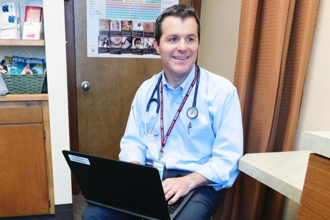Summer Fun Means More Summer Dangers

The Saint Alphonsus Medical Center sees many, many adult and youth patients each summer who get injured or become ill while enjoying Idaho's beautiful outdoor weather. Taking a few precautions provided by physicians and nurses will help you and your family stay safe, avoid mishaps and have a (positively) memorable summer.
Beat The Heat
Long-awaited summer sun provides endless hours of outdoor sports, swimming, fishing, camping, hiking and picnicking opportunities. Unfortunately, it can also lead to sunburn, sunstroke, dehydration, cramps, skin cancer and other problems.
The best protection from the sun and heat is repeated application of broad-spectrum (UVA and UVB) sunscreens, protective clothing and hats.
Shae Johnson, DO | Family Medicine, Saint Alphonsus Medical Group
Re-apply sunscreen every two hours, and sit in the shade if you'll be outdoors for extended periods. It's also important to stay hydrated, starting with water and moving to a sports drink if you are sweating for more than an hour. Liquids can help regulate your body temperature, prevent your muscles from cramping and provide nutrients you lose through sweat, such as sodium and potassium. Don't wait until you're thirsty to drink — at that point, you might already be dehydrated. Keep sipping throughout your time outdoors to prevent heat problems.
Don't Fool With Mother Nature
Heading outdoors lets you enjoy nature, but it's important to prevent nature from enjoying you! "We encourage the use of insect repellents containing active ingredients registered with the EPA," says Dr. Johnson. "Regardless of the product, reapplication is recommended if you start to get insect bites." In addition to bug sprays and lotion, pest-repellent candles, tiki torches and even a simple fan, close by, can reduce the number of insects around you.
If bug bites don't start to heal with a lotion made for treating them, see a medical specialist before the wound gets severe. Do the same with sores or rashes caused by plants. Poison ivy or oak can quickly spread from the contact point to much of your body if not treated correctly.
If you're bitten by a snake, try to get a photo of it and contact a medical provider immediately to identify whether the snake is poisonous.
Get Real (Safe) with Wheels
Cycling, skating and skateboarding are summertime favorites, but cause countless broken bones, sprained ankles, blown knees, bumps, bruises and other problems.
Adults should set an example for kids by wearing their own helmets. If possible, teach kids how to shoulder roll when falling, rather than sticking their arms straight out and trying to break a fall with the hand.
Always wear a helmet, making sure it's level, covers the forehead, and is securely fastened under the chin. When fitting a chin strap, allow for a distance of two fingers between the chin and the strap.
Dr. Johnson
Be Wise When Wet
More than 10 people in the U.S. die from drowning each day, according to the Centers for Disease Control and Prevention. If you own a pool, do a walk-around and examine your deck, ladders, fence, lights and safety features and accessories well before your first swim party. Do an audit of your boat to make sure you have everything you need in the event of a problem.
"Learning to swim is one of the best ways to stay safe in the water," says Dr. Johnson. Swimming lessons can help children, and adults, learn to swim responsibly and safely, including how to use the buddy system and the proper ways to perform a rescue. Think, "Reach, Throw, Row, Go" when attempting a rescue.
Easy, Riders
Technology has greatly expanded the way we get around recreationally. Scooters, ATVs, motorcycles, mini-bikes, Segways, go-karts, hoverboards and other motorized vehicles make summer the most mobile time of the year. Make sure you know how to stop, turn, accelerate, decelerate and stop any ride you buy, rent or borrow.
In addition to the same injuries people get on bikes and skates, head injuries can be much more serious at higher speeds. "All ATV riders should wear full protective gear, including ATV-specific helmets," recommends Dr. Johnson.
Eat, Love, Play
Cookouts, barbecues and picnics let you extend your time outdoors all summer long. Make sure you keep safe and healthy by taking the right food-safety precautions when eating outdoors, and teach kids how to avoid getting sick, poisoned or burned.
"Keep your food at the proper temperatures to prevent foodborne illnesses," warns Dr. Johnson. "The FDA has recommended that foods not remain out for longer than one hour if outdoor temperatures are about 90 degrees."
Invest in a meat thermometer to use when cooking out and check your smartphone to find the right internal temperatures for beef, chicken, fish, pork and other proteins. Don't leave a grill unattended when kids are around, have a water spray bottle to help with sudden flare-ups, and keep burn ointment or spray handy.
Avoid the Rocket's Red Glare
Be extremely careful when using fireworks, which includes learning your local ordinances, scouting out the area where you'll set them off, and having a fire extinguisher handy when using these items. Know exactly where everyone is each time you light a firework and have a first-aid kit with items for treating burns.
To learn more about Dr. Shae Johnson or to request an appointment, visit: www.saintalphonsus.org/shae-johnson
For the benefits of establishing care with a Family Medicine Provider and to find a location nearest you, visit: www.saintalphonsus.org/family-medicine
Written by: Steve Milano

